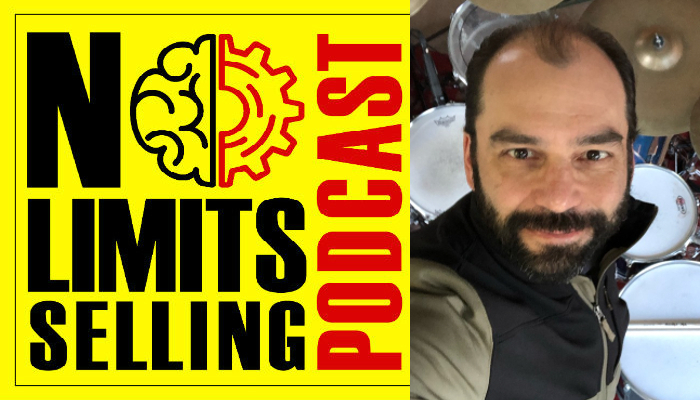Dan Ostrowski on The Art of Writing Sales Copy
On Episode 81 of The No Limits Selling Podcast, we have Dan Ostrowski, Publisher, Connector, Copywriter, and Music Producer. Dan Ostrowski is Director of Donovan Health Solutions where he produces content focused on the health benefits of sound, music, and rhythm. Dan is a creative executive with a demonstrated history of sales success in direct response marketing, telesales, copywriting, podcasting, large-scale international and domestic event production, and big-picture digital marketing ideas and processes that add millions to his client's bottom line.
Dan has generated over $100 million in personal direct response marketing sales in publishing, podcasting, and live events. He's an avid drummer, husband, and proud father of three sons. Dan is also the Founder of ALIVEARTS Agency & Rockhouse Arts Foundation.

Contact Dan:
- Website - Donovan Health
- Website - Alivearts Agency
- Website - Rockhouse Arts Foundation
Check out more podcasts at https://nolimitsselling.com/
[EDITOR’S NOTE: This podcast is sponsored by No Limits Selling. It is a fun, fast-paced podcast that delivers hard-fought business advice that you can implement today to improve your sales and performance]
Interested In Our Real Estate Coaching Services? Explore Our Website: Link
Feeling Not Well Today? You Can Use Our Mindset Boosters App To amp Up Your Mood: Link
Find us on Social Media:
LinkedIn | Facebook community | Instagram
Like what do you listen to? Subscribe to our podcast!
Ready to become fearless? We can help you become fearless in 60 days so you accomplish more in your career Schedule A 15 min Call with UmarSummary
Introduction and Background
The podcast begins with an introduction of Dan Ostrowski, a multifaceted individual who is a publisher, connector, copywriter, and music producer. Ostrowski shares his background, detailing his journey from a young age to his current career. He talks about his early interest in music and how it led him to become a music producer. He also discusses his passion for writing, which eventually led him to become a copywriter.
Career Path and Challenges
Ostrowski discusses his career path, highlighting the challenges he faced and how he overcame them. He shares his experiences in the music industry, including the highs and lows, and how these experiences shaped him as a person. He also talks about his transition into copywriting and publishing, explaining how he used his writing skills to create compelling content and connect with audiences.
Role as a Connector
In this section, Ostrowski delves into his role as a connector. He explains how he uses his network and relationships to bring people together, create opportunities, and facilitate collaborations. He shares examples of successful connections he has made and the positive impact these connections have had on individuals and businesses.
Insights and Advice
Towards the end of the podcast, Ostrowski shares his insights and advice for others. He emphasizes the importance of perseverance, resilience, and a positive mindset in achieving success. He also encourages listeners to pursue their passions and not be afraid to take risks. He shares his philosophy of life, which includes being open to new experiences, learning from failures, and always striving for improvement.
Conclusion
In conclusion, the podcast presents an in-depth exploration of Dan Ostrowski's multifaceted career as a publisher, connector, copywriter, and music producer. Ostrowski's journey is marked by his passion for music and writing, his resilience in overcoming challenges, and his knack for connecting people and creating opportunities. His insights and advice serve as a testament to his experiences, emphasizing the importance of perseverance, risk-taking, and a positive mindset.
Ostrowski's story is a testament to the power of pursuing one's passions, learning from failures, and continuously striving for improvement. His future aspirations reflect his ongoing commitment to making a positive impact through his work and inspiring others to believe in their abilities and strive for success.
Questions & Answers
Who is Dan Ostrowski?
What is Dan Ostrowski's background in music production?
How did Dan Ostrowski transition into copywriting and publishing?
What does Dan Ostrowski do as a connector?
What advice does Dan Ostrowski offer for aspiring professionals?
What are Dan Ostrowski's future plans and aspirations?
What are the key takeaways from Dan Ostrowski's podcast interview?
Don’t miss this opportunity to transform your real estate career with one-on-one coaching. As an experienced real estate coach, I, Umar Hameed, am dedicated to helping you unlock your full potential and achieve your real estate goals. To learn more about who am I and my clients ↓
If you’re ready to take the next step, book an appointment with me today and begin your journey toward success in the real estate industry.
